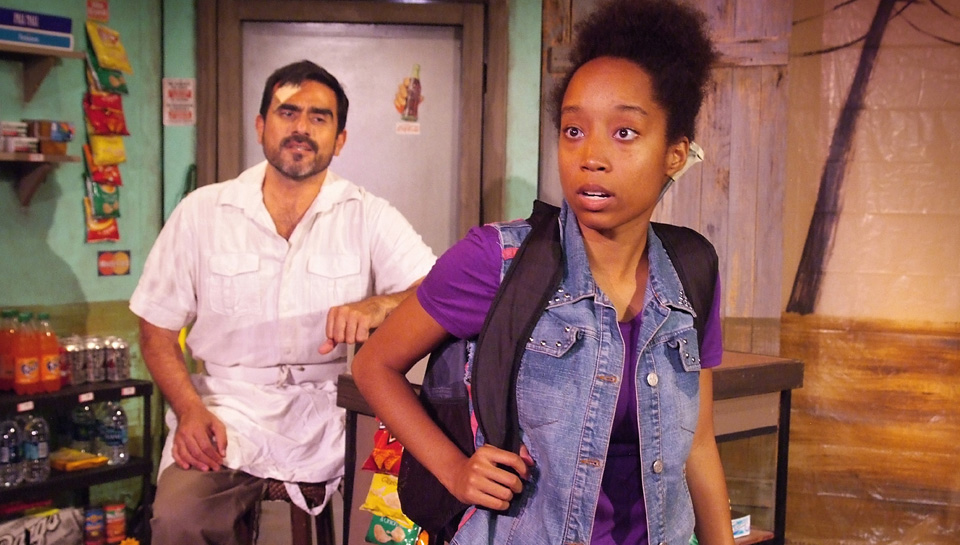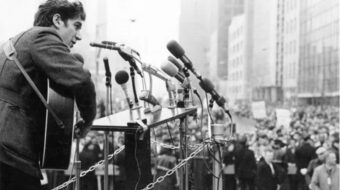
LOS ANGELES—Once again, The Fountain Theatre hits it out of the ballpark with Jeremy J. Kamps’ powerful and poetic treatment of a current issue—one of so many these days—that’s eating away at the soul of America. It’s Hurricane Katrina and its long-lasting aftermath.
“This play couldn’t be more timely,” says Fountain co-artistic director Stephen Sachs. “Hurricane Katrina may have ceased in 2005, but the storm of racism, poverty and class inequality rages on in our country to this day. We need look no further than Flint, Michigan, to see systemic government prejudice against citizens of color and the poor. But as Jeremy’s play so beautifully demonstrates, the bonds of family and community will weather any storm.”
That observation preceded Harvey and Irma and Maria. It’s so much more true now, but dire necessity is testing family and community bonds very sorely.
When I first got into publicity and public relations work, a mentor advised me to write a press release in such a way that you would want a newspaper to reprint it word for word because that’s exactly what you want to get out to the world. So now, dear readers, sue me, but I’m going to let The Fountain help me for a while with some of the heavy lifting:
When Kamps traveled to New Orleans two years after Katrina to volunteer “gutting and mucking” (stripping homes to the studs to remove mold), he already had an idea in his head about a runaway girl, Kali (Camille Spirlin) who collects other people’s garbage, finding meaning in the meaningless.
“Kali’s world paralleled the displacement, hope for renewal, fracture and resilience I was seeing in the social-political reality of the Lower 9th Ward,” he explains. “Whenever a character’s inner life and experience are so congruent with an important social issue, that’s the story I want to write.”
Katrina’s impact has been so strong that at present there is actually a second play running about it in L.A., the recently opened Head of Passes at the Mark Taper Forum.
While in New Orleans, Kamps met Antoine, a man in his ’70s who had just returned to what had been his family’s home for generations. Antoine was going from house to house trying to trace relatives, friends, acquaintances and neighbors, to find out what had happened to them in the years since the storm. “His friendship helped me honor the stories of this community in a truthful way—to see the past, present and future of the Lower 9th through their eyes,” says the playwright.
According to Runaway Home’s director Shirley Jo Finney, “Because the media painted them as poor and impoverished, most people don’t realize that the residents of the Lower 9th were working class homeowners. Those homes had been in families for generations. Members of the community were expecting government funds so they could rebuild, but because of red tape and bureaucracy, the money never came, or it took so long that people had to end up using it for rent or just to eat…. What happens to people when they aren’t seen, when they don’t feel safe? How do you begin to rebuild your life when nobody cares?”
Kamps focuses on the strained relationship between Kali and her mother Eunice (Maya Lynne Robinson), neither of whom ever had the chance to successfully process the trauma of flood and loss that they suffered together. In the raging torrent they lost Eunice’s Mama, Kali’s grandma. The one hour forty-minute one-acter is a pageant of betrayal real and imagined, of senseless violence against self and others, of wrecked lives very near impossible to put back together. Yet it also bubbles over with a wry, twisted humor and a stream of poetry that Kali has adopted as her only salvation.
Kali is fourteen, a rascally teenager street-smart beyond her years, yet vulnerable, tender, scared and naïve at the same time. She has a right to be full of rage at the world, yet as we watch her cajole, manipulate and threaten, invent lies and steal, we know this is a young kid we will want—and need—to understand and forgive some day.
Other characters who interact with the mother and daughter include Armando (Armando Rey), an undocumented small convenience store owner from Oaxaca whose dream is to bring his two beautiful daughters to the States, showing the wider range of refugees and wanderers across the New Orleans landscape.
Mr. Dee (Jeris Poindexter) is modeled on Kamps’ friend Antoine, an elderly survivor of storm and desertion with a gentle, wistfully lusty attitude. He leads the crowd at a protest rally Shana organizes in some clever African-American folk ditties (which many in the audience joined in on). Tat (Leith Burke) finds Eunice at last, each believing the other to have drowned in the deluge, and love may blossom anew, but it’s not an entirely happy reunion: There are issues of abandonment to work out.
Eunice’s neighbor Shana (Karen Malina White) is a former school teacher and neighborhood activist wearing a “Yes We Can” tee shirt—it’s 2008, three years after “Bush’s” Katrina—trying to save homes and memories. Although I don’t recall Kamps specifically saying it, Shana is a forceful reminder of the “shock doctrine” in action—New Orleans is a good case study—where under extraordinary circumstances the public school system was almost completely dismantled, the teachers’ union dissolved, and private charter schools established. Once she gets her life back on course, Kali starts attending such a school. As Shana angrily, pointedly says, “Katrina ain’t shit compared to white men in suits.” No wonder, as Mr. Dee reminds her, during slave times Black folks fled to this almost uninhabitable Lower 9th swamp to become Maroons.
Finally, there’s Lone Wolf (Brian Tichnell), the only white character in the cast, who has come down from Michigan as a seitan-eating “gutter and mucker,” but with an added agenda: He describes himself an an “anarcho-Trotskyist” who wants regular people to get together to resolve their own problems without any government intervention. He sees the beleaguered people of the Lower 9th Ward as ideal candidates to start a revolution—of which he, of course, will be the political guru. Alas, such types emerge in every time and place where working people are trying to achieve gains.
Runaway Home encapsulates a community, but the sassy, fast-talking Kali is definitely its protagonist. “When they ask me what I think, they call it talking back,” she observes sharply.
Kamps writes in a rich, popular vernacular and it rushes by at a fast clip. Audience members surely cannot pick up every word. But I think that is the playwright’s point: to recapitulate the rush of water from the broken levee in the avalanche of words. Oh, I thought more than once, if the actors would only slow down a bit so I could appreciate the sheer poetry they’re speaking. But no, life implodes on us, and sometimes so does theatre. If we want to know a community through the art it produces, we must understand that we will not instantly get every pungent word, every obscure reference, every edgy nuance. Not always easy to grasp on a first exposure, a second look would be well rewarded.
Kamps captures a time, and in many ways it is still now, when “the neighborhood is gone, but everyone’s a suspect,” and those who want to hold onto what little they had are seen as standing in the way of progress.
In Kali’s final thought, Kamps voices what all people in struggle know: That in the wake of Mama’s death and never recovered body, “If she’s gonna rest, it’s gonna be through us.”
The creative team for Runaway Home includes scenic designer Stephanie Kerley Schwartz, lighting designer Jennifer Edwards, composer/sound designer Peter Bayne, costume designer Naila Aladdin Sanders, props designer DeAnne Millais, choreographer Janet Roston and dialect coach Tyler Seiple.
Runaway Home plays through Nov. 5, Sat. and Mon. at 8 pm and Sun. at 2 pm at The Fountain Theatre, 5060 Fountain Ave. (at Normandie), Los Angeles 90029. For tickets call (323) 663-1525 or go to www.FountainTheatre.com. Rush seats are $20 (at the door, 15 mins. prior to curtain, subject to availability), and Monday nights are Pay-What-You-Want. The Fountain Theatre is donating a portion of all ticket sales from this production to the Houston Food Bank.










